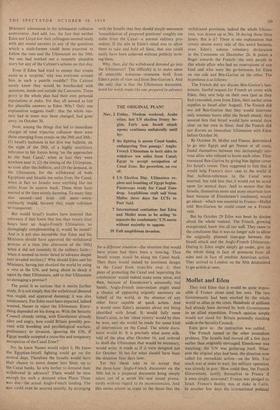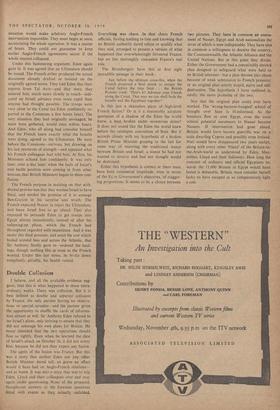Mollet and Eden
They told Eden that it would be quite impos- sible if France alone used her veto. The two Governments had been marked by the whole world as allies in the crisis. Hundreds of millions had already been devoted by both Governments to an allied expedition. French opinion simply would not stand for Britain pointedly standing aside in the Security Council.
Eden gave in: the instruction was cabled.
The French turned to the other immediate problem. The Israelis had moved off a few days earlier than originally envisaged. Eisenhower was watching: the UN was gathering itself. What- ever the original plan had been, the situation now called for immediate action,—on the 30th. Too much was at stake to wait; the military operation was already in gear. How could they, the French Government, justify themselves to France if it were simply unwound? France was pledged to Israel, France's destiny was at stake in Cairo. In another few days the international political
situation would make arbitrary Anglo-French intervention impossible. They must begin at once, accelerating the whole operation. It was a matter of hours. They could not guarantee to keep earlier Anglo-French agreements secret if the whole venture collapsed.
Under this hammering argument, Eden again gave in. It was agreed that an Ultimatum should be issued. The French either produced the actual document already drafted or insisted on the originally agreed terms. They told Eden that their reports from Tel Aviv—and they were, they assured him, much more closely in touch—indi- cated an Israeli advance even more rapid than anyone had thought possible. The troops were very close to the Canal (as Eden confidently re- ported to the Commons a few hours later). The very situation they had originally envisaged, he must have gathered, would exist within hours. And Eden, who all along had consoled himself that the French knew exactly what the Israelis were doing, agreed to the Ultimatum. He went before the Commons—nervous, but drawing on his last resources of strength—and repeated what his French colleagues had told him. At first. his Ministers echoed him confidently. It was only later, over a day later, when the facts of Israel's real battle position were coming in from other sources, that British Ministers began to show con- fusion.
The French purpose in insisting on that with- drawal proviso was that they wanted Israel to have Sinai, and needed the promise of it to assuage Ben-Gurion in his surprise and wrath. The French expected Nasser to reject the Ultimatum, and leave Israel free to go ahead. They also expected to persuade Eden to get troops into Egypt almost immediately, instead of after his softening-up phase, which the French had throughout regarded with impatience. And it was under this final pressure, and amid the row which boiled around him and across the Atlantic, that Sir Anthony finally gave in—ordered the land- ings, though nothing like as soon as the French wanted. Under this last stress, he broke down completely, pitiably, his health ruined.











































 Previous page
Previous page